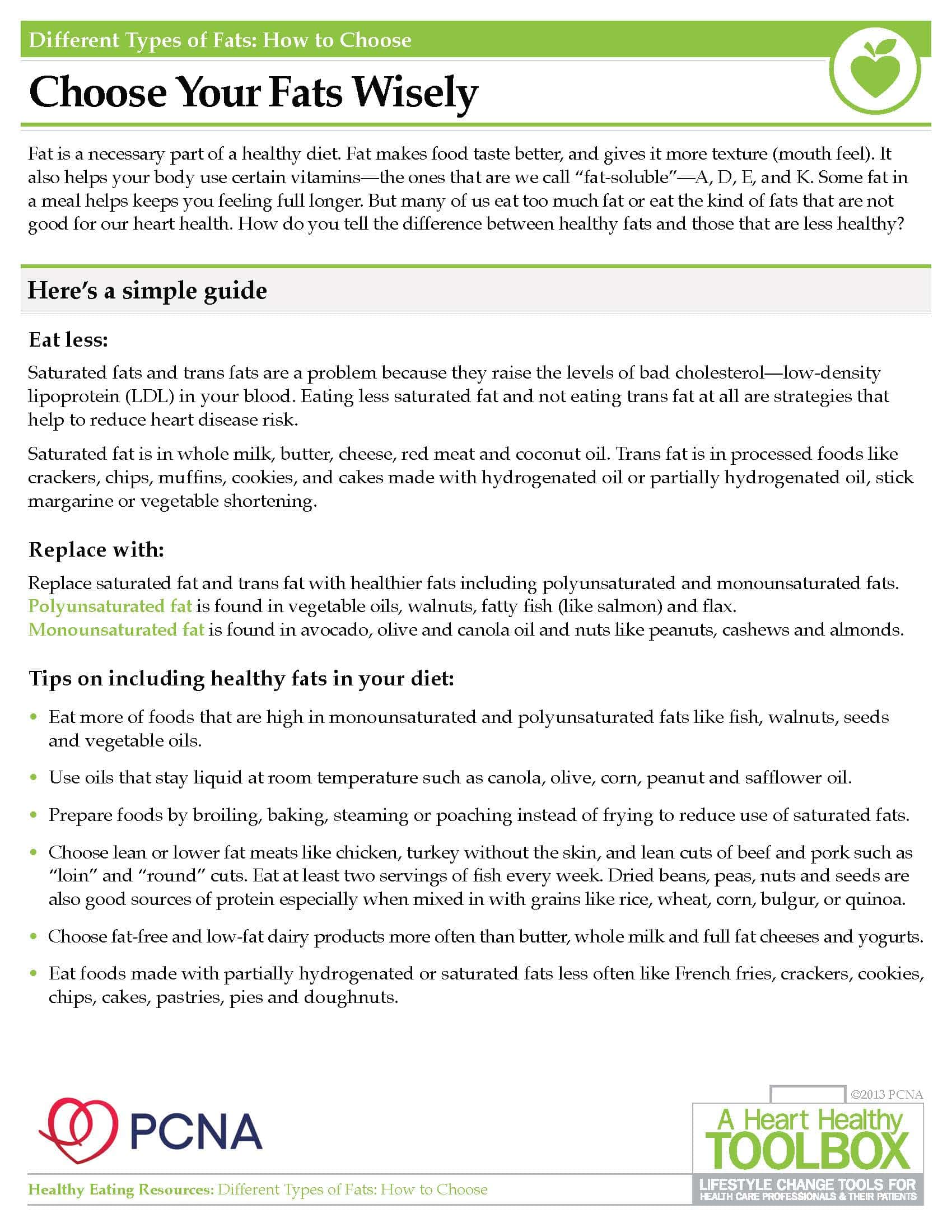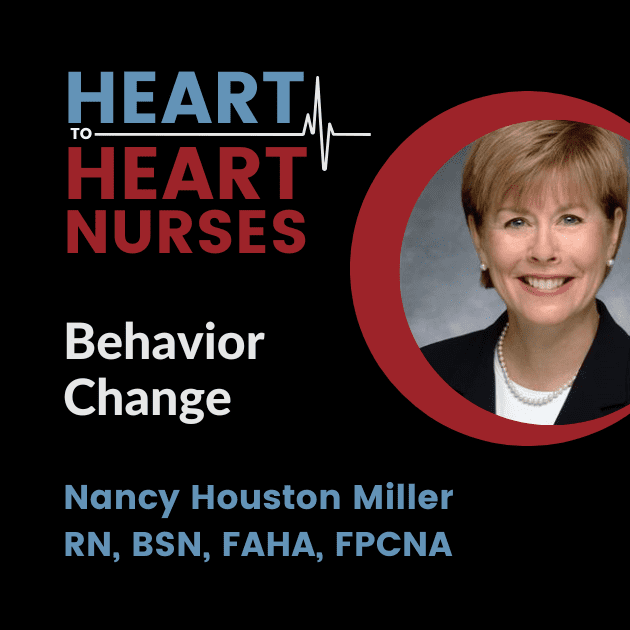Join Nancy Houston Miller, RN, BSN, FAHA, FPCNA for a behavior change podcast episode. Our guest will discuss the process of health behavior change and resources that can assist you and your patients. Whether the topic is diet, exercise, smoking, medication adherence, or other behaviors, partnering with your patients is a key to success.
Episode Resources
- CE course – PCNA Behavior Change mini-certificate
- Transtheoretical Model of Behavior Change (Prochaska, JO)
- Social Learning Theory (Bandura): Bandura A. Social Learning Theory. Englewood Cliffs, NJ: Prentice-Hall; 1977.
- Steve Rollnick
- William Miller
Welcome to Heart to Heart Nurses, brought to you by the Preventive Cardiovascular Nurses Association. PCNA’s mission is to promote nurses as leaders in cardiovascular disease prevention and management.
Geralyn Warfield (host): Welcome. Today we’re in conversation with Nancy Houston Miller. Nancy, could you introduce yourself to our audience?
Nancy Houston Miller (guest): Certainly, Geralyn. Thank you. I’m Nancy Houston Miller and I’m director of the Life Care Company, which is a company that really involves patient care, and with those with complex medical problems. And I have also been in the School of Medicine at Stanford, where I was doing prevention and rehabilitation of patients with coronary heart disease. So, I’m pleased to be here today.
Geralyn Warfield (host): Well, we’re so lucky to have you sharing your expertise on health behavior change today, a topic that’s near and dear to probably each and every one of our listeners. And we know that there are a lot of factors [00:01:00] that are involved in health behavior change. Can you talk a little bit about what influences that behavior change process?
Nancy Houston Miller (guest): Certainly. Well, I think that, obviously, we have a lot of, of theories, and a lot of models that we can draw upon related to health behavior change. We also have communication techniques such as motivational interviewing, which, certainly helps healthcare professionals in helping individuals to change their behavior. A couple of the theories that I think are critically important that people know are, are that of, of not only one’s readiness to change, which is the Transtheoretical Model, but also that of Social Learning Theory by Bandura. And, those two models, I think, come to the forefront in terms of helping people adopt changes.
I think when it gets to maintenance, we all know that at any point in time, we can fall off the wagon, unfortunately, and go back to an old behavior [00:02:00] in many cases. And that’s where relapse prevention, you know, training, becomes critically important.
But it’s not just the models and the theories. It’s really knowing the elements of health behavior change that were developed by the psychologists. And these include everything from setting realistic goals, to helping people with self-monitoring, to looking at cues and prompts related to, to behaviors, to rewarding success when one makes a behavior change, and things such as enlisting social support from individuals.
So, I think it’s critically important that people understand that theories and models are important, and they do affect health behavior change, but you’ve got to go beyond—and communication techniques become critically important, especially with readiness to change as well as the elements of health [00:03:00] behavior change.
Geralyn Warfield (host): So, as we’re thinking about our patients, can you tell us whether or not all risk factors are the same?
Nancy Houston Miller (guest): All risk factors are, are the same, in some regards, in that a couple of the elements of health behavior change come to the forefront, such as setting goals. But they’re also very, very different. The addictive behaviors are quite different than picking up a new behavior such as exercise, a positive behavior, and changing diet.
And I will use medication-taking as a prime example. The single most common reason as to why people don’t do well with adhering to medications is because they forget their medicines. And so, the most important element of health behavior change is really queuing and prompting. So people don’t forget to take their medicines.
When you talk to weight loss experts, self-monitoring is the critical [00:04:00] element of health behavior change that is so important to that particular behavior. And then with the addictive behaviors, whether it’s, you know, giving up alcohol, or smoking, or weight loss, once again, relapse prevention really becomes important and therefore identifying high-risk situations that may cause you to relapse, and really developing strategies to overcome those high-risk situation, situations, becomes critically important.
Geralyn Warfield (host): I really appreciate the fact that you have mentioned topics where we recognize that behavior change is not linear. That there are a lot of ups. There are a lot of downs. There’s some back slips. We move forward and we are all human. And I know sometimes as providers, we’re not able to give our patients all the support that they need. And so, some individuals are those that benefit from [00:05:00] health coaches that are outside of our healthcare system. Would you be willing to talk a little bit about some techniques for successful health coaching, be that in the clinical practice, or maybe beyond?
Nancy Houston Miller (guest): Certainly. I think it’s, I think the difficulty is that people believe that the coaching aspect is, is very, very difficult and takes a lot of work. And certainly, when you go to, there are many, many in-depth courses that you can go to around motivational interviewing, around coaching. And I would suggest people that really are going to be dealing with risk factor management do, you know, try and avail themselves of those kinds of, of courses and techniques.
But if you’re really looking at trying to help people, you really, the first thing is trying to assess their readiness. And so, you can use Prochaska and Di Clemente‘s readiness scale in order to determine one’s readiness. And if people are really contemplating, or in action, the action phases, they’re [00:06:00] really ready to make changes.
That is often 50% of the population. And it’s those patients you really want to, and individuals, that you really want to focus on. If people are not ready for change, you’ve got to under, you’ve got to uncover the barriers as to why, you know, they may not be ready, and continue to provide them with important messages around health behavior change, which will eventually allow them to think about the importance of the change.
And the second step, so that, that becomes the process of assessing readiness as a, as a first step. For those individuals that are ready to make changes, then it’s really a matter of determining some goals, short-term goals that are really important to individuals, and not long-term goals, because it’s much easier for patients to succeed initially with health behavior change if the goals are very short-term. That may be a [00:07:00] week, two weeks, even a month, you know, in order to make that change.
The goals have to be what we term SMART goals. In other words, they need to be measurable. They need to be very defined for individuals such as, “You need to walk, or, we’ve suggested that you walk on level ground at two miles an hour over the next two weeks, every day” as an example of a, of a SMART goal. So, you’re really helping people to, to develop goals and determining how they can self-monitor. So self-monitoring in the adoption of any behavior becomes critically important, especially in the first three months, as people are making health behavior changes.
And then certainly as a third step, you as a healthcare professional always want to provide feedback and follow-up with individuals. So, the third step in the process is really follow-up. And this helps to reinforce [00:08:00] to individuals that you really care that they’re attempting health behavior changes. It gives them positive reinforcement for continuing to engage in that health behavior change, until they can internalize the behavior. And, and it shows them that, as I said, you really care, and if you need to modify a behavior because people can’t, the goal is set too high, you will do that in follow-up.
So, and with regard to the long-term maintenance of the health behavior change, it’s really critically important that you focus on, on relapse and helping people to identify those high-risk situations that may cause them to relapse, to the old, to an old behavior; they’re constantly—and, and to recognize that, if they slip, it’s a slip and it’s an opportunity to simply not feel guilt and failure, [00:09:00] but to get back on track.
Geralyn Warfield (host): Those are great strategies that you’ve just discussed. And we look forward to talking with you further in just a moment.
Geralyn Warfield (host): We’re with Nancy Houston Miller talking about health behavior change. Nancy we’ve spoken most recently in our conversation about health coaching. And I’m wondering if there’s a way to simplify the steps of the coaching process.
Nancy Houston Miller (guest): So, I think there’s, there are many ways to simplify the coaching process. I’ve, I think, tried to give you some initial, you know, information, but I think we need to think about it as a process of constantly communicating with patients, constantly assisting them by educating them on the importance of the, of the behavior change process. And then by giving them the tools that they need to, to make health behavior changes.
For example, I’ll take exercise as an example. And people need to know [00:10:00] they need to have the appropriate equipment as an example, that they’re going to undertake an exercise program. They need to often have those kinds of things in front of them. So that leaving their, their walking shoes, you know, in, in the bedroom and that’s right in front of them when they wake up, so that they’ll go on a walk is, is an important technique for those individuals.
And they need to have the support, as I mentioned earlier, of having healthcare professionals who are really credible sources of authority for health behavior change, to follow-up with them. So that they, if goals are set too high, or they’re struggling, and they’re having barriers, you can work through a problem-solving approach, you know, in order to reset new goals and allow people to have an increased confidence—or what is known as [00:11:00] self-efficacy—for change over the long-term.
Geralyn Warfield (host): So, are there groups that you can recommend to help in this behavior change process?
Nancy Houston Miller (guest): Many people can avail themselves of groups, whether it be for smoking cessation, or managing diabetes, and all of the health behavior changes that go along with that particular condition. And they benefit from observing and seeing how others have done these kinds of things, in a group setting.
Unfortunately, less than 20% of the population seems to, to join groups and, but they can be highly successful. And one of the things that’s critically important if people do join a group, we know that adherence falls off once they leave the group setting. So, you really, in the group, have to prepare for, how people can continue to succeed with health [00:12:00] behavior changes once they, they are on their own. And you need to transfer that group process to potentially other individuals, such as friends, family members, in the environment that can support them with the maintenance of health behavior change.
Geralyn Warfield (host): So, we have covered a lot of topics today about health behavior change and I suspect some of our audience is going to be interested in learning even more. What kind of resources would you point them towards?
Nancy Houston Miller (guest): Well, there are many resources, as I mentioned earlier, on health behavior change, and courses, especially around motivational interviewing. Steve Rollnick and William Miller, who are, developed, much around motivational interviewing, even have a course related to healthcare professionals and learning techniques for motivational interviewing to support individuals.
The Preventive Cardiovascular Nurses Association also has many resources [00:13:00] on our website at pcna.net, where we have just completed, also, a health Behavior Change Mini Certificate course, which is divided into four or five modules. And the, you will find a lot of techniques there to support patients in your efforts around health behavior change with risk factor modification,
Geralyn Warfield (host): Nancy, is there anything else that you would like to share with our audience that I’ve neglected to ask?
Nancy Houston Miller (guest): Well, I think one of the things that’s important for people to realize is that you, health behavior change isn’t easy. And if you are constantly learning, and constantly reevaluating your success, and your techniques as a healthcare professional, and constantly learning new ways to help individuals, you will succeed. But recognize it’s a process and it takes [00:14:00] dealing with a lot of patients.
And try not to get frustrated over the 20% or so that are never going to change, but focus on the 80% or more that you are going to have success with.
Geralyn Warfield (host): Those are great, great considerations. Nancy, it has been a delight spending time with you today talking about health behavior change. This is your host Geralyn Warfield, and we will see you next time.
Thank you for listening to Heart to Heart Nurses. We invite you to visit pcna.net for clinical resources, continuing education, and much more.
Topics
- Lifestyle and Behavior Change
Published on
October 4, 2022
Listen on:

RN, BSN, FAHA, FPCNA
Related Resources







